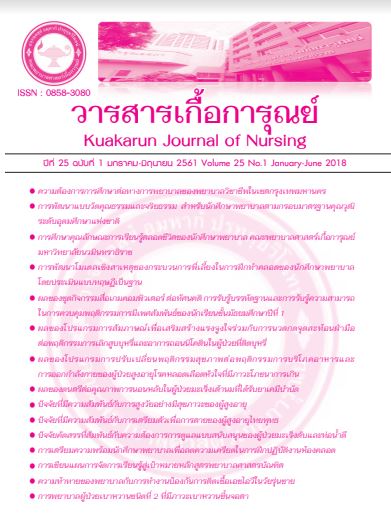การพัฒนาแบบวัดคุณธรรมและจริยธรรม สำหรับนักศึกษา พยาบาลตามกรอบมาตรฐานคุณวุฒิระดับอุดมศึกษาแห่งชาติ
คำสำคัญ:
พฤติกรรมคุณธรรมจริยธรรม, นักศึกษาพยาบาล, กรอบมาตรฐานคุณวุฒิระดับ อุดมศึกษาแห่งชาติบทคัดย่อ
การวิจัยครั้งนี้เป็นการวิจัยเชิงบรรยายมีวัตถุประสงค์เพื่อสร้างและพัฒนา พร้อมทั้งตรวจสอบแบบวัดคุณธรรมจริยธรรมตามกรอบมาตรฐานคุณวุฒิระดับอุดมศึกษาแห่งชาติ
(TQF) กลุ่มตัวอย่าง คือ นักศึกษาพยาบาลชั้นปีที่ 1 ถึงปีที่ 4 ที่กำลังศึกษาอยู่ในภาคการศึกษาที่ 2 ปีการศึกษา 2557 หลักสูตรพยาบาลศาสตรบัณฑิตของสถาบันการศึกษาในเขตภาคตะวันออก ปี พ.ศ. 2557 จำนวน 517 คน ประกอบด้วยวิทยาลัยพยาบาลพระปกเกล้าจันทบุรี คณะพยาบาลศาสตร์มหาวิทยาลัยบูรพา วิทยาลัยพยาบาลบรมราชชนนีชลบุรี วิทยาลัยนานาชาติเซนต์เทเรซาและมหาวิทยาลัยศรีนครินทรวิโรฒ เลือกกลุ่มตัวอย่างโดยวิธีการสุ่มแบบหลายขั้นตอนเครื่องมือที่ใช้ในการเก็บรวบรวมข้อมูลเป็นแบบประเมินตนเอง ลักษณะแบบประเมินเป็นมาตรประมาณค่า 4 ระดับ ได้ผ่านการตรวจสอบความตรงเชิงเนื้อหาจากผู้ทรงคุณวุฒิ 5 ท่าน หาความเที่ยงของแบบประเมินทั้งฉบับด้วยวิธีของครอนบาคได้ค่าความเที่ยง .97 วิเคราะห์ข้อมูลโดยการวิเคราะห์ตัวประกอบเชิงสำรวจ (exploratory factor analysis) สกัดตัวประกอบหลัก (principle component analysis) และหมุนแกนแบบออโธโกนอล(Orthogonal) ด้วยวิธีแวริแมกซ์ (Varimax) ผลการวิจัยสรุปได้ดังนี้ ตัวประกอบพฤติกรรม คุณธรรมจริยธรรมของนักศึกษาพยาบาล ตามกรอบมาตรฐานคุณวุฒิระดับอุดมศึกษา (TQF) มีจำนวน 9 ตัวประกอบ 71 ตัวบ่งชี้ สามารถอธิบายความแปรปรวนร่วมกันได้ร้อยละ 64.94
เรียงลำดับตามอัตราร้อยละของความแปรปรวนได้ดังนี้
1) การปฏิบัติตามจรรยาบรรณวิชาชีพเคารพในคุณค่าและศักดิ์ศรีของความเป็นมนุษย์และส่งเสริมสิทธิผู้ป่วย
2) หลักจริยธรรม
3) ความรับผิดชอบต่อตนเองและผู้อื่น
4) ความซื่อสัตย์
5) การควบคุมตนเองได้
6) การเป็นแบบอย่างที่ดี
7) การแยกแยะความดีความชั่วได้
8) ความมีระเบียบวินัยและ
9) ความรู้ความเข้าใจในหลักศาสนา

















